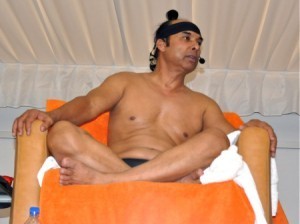Bikram Choudhury continues to press copyright claims in hot yoga routine
 You have to hand it to Bikram Choudhury, the multimillionaire hot yoga impresario — the man has a lot of nerve. Choudhury has for years now been claiming a copyright in the particular sequence of yoga poses that his students (for reasons that escape us) choose to perform in stifling 105 degree heat. And he’s spent a lot of money on lawyers to sue yoga instructors — many of them Bikram’s former students — who dared to implement the same or a similar sequence of poses in their own studios.
You have to hand it to Bikram Choudhury, the multimillionaire hot yoga impresario — the man has a lot of nerve. Choudhury has for years now been claiming a copyright in the particular sequence of yoga poses that his students (for reasons that escape us) choose to perform in stifling 105 degree heat. And he’s spent a lot of money on lawyers to sue yoga instructors — many of them Bikram’s former students — who dared to implement the same or a similar sequence of poses in their own studios.
All of this despite the fact that Bikram’s copyright claims are, in a word, absurd. The yoga poses Bikram uses have been in the public domain for thousands of years, so there can be no copyright in those. Bikram instead says he owns a copyright in the particular sequence in which he’s arranged the poses. But that doesn’t work either. Bikram claims that the poses, when performed in his particular sequence at 105 degrees, convey a variety of health benefits, ranging from the alleviation of diabetes to multiple sclerosis and obesity. In other words, Bikram claims that the sequence of yoga poses is functional. Fine, but functional things are not copyrightable. Copyright is for art and literature — not medicine. If the form of yogic medicine claimed by Bikram is protectable by any form of IP, it’s patent. And to get a patent on his sequence of poses, Bikram would have to show the U.S. Patent and Trademark Office that it’s novel, non-obvious, and useful. The PTO grants a lot of bad patents, but this one is probably a sure bet to be rejected.
Back in July, the U.S. Copyright Office issued a policy document essentially repeating the analysis above, and stating that yoga poses and sequences are uncopyrightable. You might have thought that the Copyright Office ruling would spell the end for Bikram’s litigation campaign. But you would have been wrong. LAWeekly has just run a long article on Bikram, wherein he makes clear that he’s continuing to sue — apparently, the Copyright Office ruling hasn’t deterred him a bit.
Not to blow our own horn, but we predicted this:
[T]he Copyright Office’s policy statement should put a stop to Bikram’s antics. Mind you I said “should”, not “will”. Because although the Copyright Office has this one right, courts have been known to ignore them. And Bikram is, if nothing else, persistent.
And from Bikram’s perspective, continuing to threaten suit is a completely rational move. The last thing he wants is to face more competition. Copyright lawsuits are expensive, and Bikram is in a much better position than his smaller rivals to pay pricey lawyers. And if he plays his cards right, he can tie competitors up for years, making entry into the hot yoga market pretty unattractive.
The point here is that we really have two different copyright laws. Bikram doesn’t have a monopoly on hot yoga under the copyright rules that you find in the law books. But Bikram may well succeed in suing many of his competitors out of business using the copyright law as it actually functions out in the world. Like a lot of law, copyright works a lot better for people with money.



